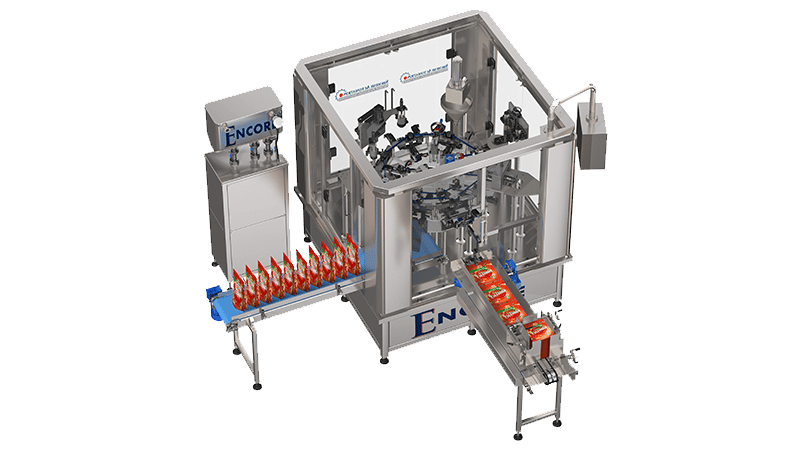Grocery Trader published the following piece about how Shemesh’s all-in-one packaging solutions can make food and beverage companies more sustainable, leave little room for human error and boost productivity. You can read the original article on pages 54-55 here.
Sustainable Packaging: How do food companies deliver sustainable packaging operations
Tony Bryant, Sales Director at Shemesh Automation, a global manufacturer of high-end packaging machinery, explains how all-in-one packaging solutions can make food and beverage companies more sustainable, leave little room for human error and boost productivity.
Packaging plays an important role in promoting brand awareness and shelf appeal in retailers’ food aisles – it’s a very competitive market. However, packaging suppliers also need to reduce their carbon footprint and offer sustainable, well-designed packaging and correctly positioned labelling that is distinctive and does what it says on the pack.
There is a global trend towards trying to keep production processes in-house to cope with supply chain pressures and rocketing transport costs. But where companies have not automated their lines, they are regularly suffering with staff shortages which are having a knock-on effect on productivity. Fully automated operations are cost-effective and can rapidly boost output of food and beverages.
Automation can boost staff skills
Flexibility is key for managing diverse products, such as soups, sauces and soft drinks which can come in a variety of bottle shapes, sizes and containers. Downtime for changing lines to accommodate different items can result in lost revenue. What’s needed is a hands-off approach with cutting-edge equipment that encompasses all aspects of downstream packaging from liquid filling to capping, continuous labelling and case packing.
From low viscosity sauces to sticky or chunky condiments like peanut butter, offering complete downstream, turn-key solutions can help expand knowhow, enhance production efficiency, lower costs, raise output and product quality as well as improve market share and overall profit margins for a business.
I understand some companies prefer human involvement, but why would you employ a skilled intelligent person to manually cap bottles of tomato sauce or alcoholic beverages? You can get a significant ROI with an automated capping machine that is faster, consistent and reduces the risk of errors, allowing staff to be deployed on more productive tasks better suited to their skill sets.
Hiring and retaining staff, the rising cost and availability of raw materials, soaring fuel and energy prices and the plastic packaging tax, aimed at tackling single use plastic waste, are major challenges facing food producers. Bringing everything in-house and automating processes is the driver to maximising production capacity – highly-automated processes require less close operator interaction.
Automation provides a consistent process irrespective of staffing levels. A flick of the button and you are off and running, which is a significant benefit. Thanks to modern, maintenance-friendly designs, when operators do get involved, they have optimum accessibility of machine parts allowing for tool-less changeovers quickly and safely. The latest technology is also 4.0 ready so any issues or software updates to a line can also be handled remotely as part of after-sales customer service.
The market also offers packaging machines that save energy – UK manufacturers have been grappling with spiralling price hikes for many months – and cater for the growing move away from plastic wrapping to eco-friendly and recyclable materials. This is particularly evident in fresh produce where suppliers are turning to cardboard and paper wrapping for improved sustainability.
Shoppers becoming more savvy
Shelf appeal is massively important. Shoppers are becoming more savvy because of the cost of living crisis – coupled with a stronger awareness of sustainability. Retailers are demanding that suppliers have packaging systems in place that not only protect the integrity and offer great presentation of goods, but can also accelerate the process in getting them to market and offer prolonged shelf life.
Manufacturers need to decide when working with a packaging machine supplier what their capabilities are and how they are structured for change. Reliable delivery, quality product, competitive costing and great service are still key indicators of performance.
Optimum productivity depends on the high performance of a supplier’s machinery and minimal production downtime. That’s why at Shemesh we make a worldwide network of qualified technicians available to customers 24/7, making sure there Is access to expert support whenever and wherever it’s needed.
Challenging environment
The challenge is sourcing easy-to-use systems that can seamlessly interact between brand labels, complex shapes and materials – but that don’t cost the earth. All-in-one packaging machines with completely hands-free operation increase production efficiency by encompassing all aspects of food packaging. Automating labour intensive tasks and reducing the reliance on packaging materials that incur a tax burden will make processes more sustainable.
We all have the responsibility to care for the environment and the world around us. This means making machines that are designed and built with sustainability in mind. Thanks to the latest technology advances the portioning process itself is much faster, while fewer filling stations and smaller turrets overall are required, saving space in a production plant.
The goal is to offer food and beverage manufacturers flexible filling, sealing, and capping machinery that fits their specific packaging requirements. The ability to effectively handle a variety of packaging and products is a key advantage in the highly competitive market. Also, delivering significant sustainability benefits and reductions in operational costs – alongside fast throughputs. That’s an unbeatable ROI.
You can read the full article, published in the November/December 2022 edition of Grocery Trader (pg54-55) here


